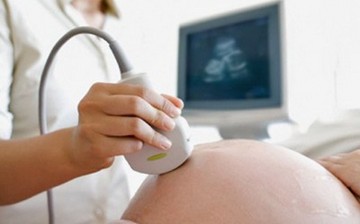Placental Abruption

Contents:
What is a Placental Abruption
Placental abruption, which occurs at early pregnancy, is an unfavorable from prognostic point of view, symptom, which subsequently extremely seriously can affect the development of pregnancy. By the severity of its course, mild, moderate and severe forms of placental abruption are distinguished.
Mild degree may not be clinically exhibited with anything; the complaints of a pregnant woman are absent. As a rule, pathology is revealed during planned performing of a medical examination and ultrasound. In case of moderate form, some painful feelings in the abdomen appear, the tone of the uterus increases, bloody discharge from genital tracts is observed.
The severity of a patient's state in case of the most unfavorable progress of placental abruption at early pregnancy is conditioned by expressed hemodynamic disorders and signs of shock: incidents of blackout, tachycardia, arterial hypotension are observed. The patient can also complain about nausea, vomiting not causing relief, a sensation of vertigo. The tone of the uterus is sharply increased, it becomes asymmetric. Such state is dangerous by development of not only extrinsic, but also of intracavitary bleeding. The fetus suffers from hypoxia.
Any manifestation of a deterioration of a woman's state in this period requires the speedy seeking of a skilled medical care. This will allow to diagnose the pathology as quickly as possible and to prescribe adequate treatment able to successfully correct the progress of pregnancy and to prevent the development of complications.
Causes of Placental Abruption at Early Gestations
The following factors can impact the untimely placental abruption:
- gestosis of the first half of pregnancy;
- age of a patient;
- autoimmune diseases;
- improper feeding;
- smoking, an alcohol abuse;
- a hypertensive disease;
- placenta or uterus pathology;
- a big quantity of childbirths or infertility in the anamnesis;
- an inflammatory process development in birth veils;
- drug allergy;
- a closed trauma of abdominal cavity organs;
- extragenital pathology (diseases of an excretory, of an endocrine, of a cardiovascular or digestive systems).
Symptoms of Placental Abruption in an Early Period of Pregnancy
The signs of early placental abruption can include the following:
- Bloody vaginal discharge is one of the frequent clinical signs. However, one is to remember that an emergence of internal bleeding is possible in some situations. In this case, the surgical interference that is made is aimed at keeping of life of the pregnant woman and, as a rule, nothing is said about the rescue of her fetus any more.
- The pain syndrome in lower parts of the abdomen can have different intensity and character. The pain can be nagging or dull, often the patient feels a pain radiation to a groin or a hip area. Sensations of pain in case of development of internal bleeding are extremely expressed.
- The increased tone of the uterus is variable, but important sign of premature placental abruption.
- Nonspecific symptoms: vertigo, a sensation of palpitation, nausea and vomiting, excessive alarm.
- All pathophysiological mechanisms in case of the placental abruption at early gestations lead to the fetus's development of oxygen failure syndrome. Due to the rapid progression of pathology and placental abruption, which is more than 50%, the maintaining of pregnancy becomes impossible.
- Sometimes this unsafe state can occur in a subclinical manner, i.e. without any subjective sensations of a woman. As a rule, these cases are recognized during a routine performing of ultrasound.
Diagnostics of Placental Abruption at Early Gestations

The ultrasonography, with the help of which in most cases the retroplacental hematoma with accompanying destruction or reversible violations of structure of subplacenta tissues is visualized, is the main instrument of the diagnostic technique of the placental abruption. However, at early stages of the disease, the retroplacental hematoma does not always form, therefore, there are also some clinical criteria, which guide in diagnostics.
They are the following:
- discharge of blood nature from genital tracts or development of intracavitary bleeding;
- disorders of fetal development (on basis of determination of frequency of cardiac contractions);
- increased tone of the uterus.
With the help of ultrasound, an accumulation of blood clots is revealed behind the stratified part of the placenta. The internal pelvic examination is obligatory for differential exclusion. Examining the vagina and the uterine cervix, the physician determines the cause of bleeding, among which there can be tumors, mechanical traumas of genital tracts, infectious and inflammatory processes. The disclosure of the uterine cervix, which could lead to a vessel injury and cause bleeding, must also be precluded.
Treatment of Placental Abruption at Early Gestations
Therapeutic arrangements in case of an early placental abruption, which is accompanied by a minor blood loss, include a prescription of a strict bed rest, spasmolytics (drotaverine, papaverine), tocolytics (drugs decreasing tone of the uterus), hemostatic agents (Vicasol), iron preparations for the purpose of elimination or prophylaxis of anemia.
At the same time, one must observe indicators of a coagulation profile not to assume a development of a disseminated intravascular coagulation. In case of adequate and timely treatment of insignificant area of the placental abruption, it is possible to preserve one`s pregnancy.
Prognosis of the Placental Abruption at Early Gestations

The premature placental abruption is a fairly prevalent pathology. In case of a skilled medical care delivery, this state will by no means affect the further course of pregnancy.
With the help of ultrasound, one can diagnose the retroplacental hematoma, which directly points towards the development of the placental abruption. If this formation is not seen, the diagnosis is based on clinical symptoms (pain syndrome in lower parts of the abdomen, bloody vaginal discharge or internal bleeding, nausea, vomiting, vertigo, tension of the uterus) and on performing of differential exclusion of other diseases of a genital system and of an extragenital pathology.
In case of timely determination and full-blown removal of the placental abruption at early gestations, the prognosis is favorable, because nothing threatens life of a woman and her fetus. However, even the minimum drifts from physiological progress of placentation require immediate hospitalization and treatment. Only in this case, one can provide the further normal progress of pregnancy, because placental abruption is the sufficiently serious state in an obstetric-gynecologic practice and its consequences are often unpredictable.
Prophylaxis of the Placental Abruption at Early Gestations
The definite specific prophylaxis of the premature placental abruption is not developed, because the veracious causes of its development are not studied to the end, and there are many provoking factors. The general prophylaxis of pathology of pregnant women envisages regular medicals, a timely provisioning of required analyses, periodic subjection to necessary instrumental surveys.
The future mother is obliged to know about importance of such factors as keeping of a healthy lifestyle, balanced nutrition, minimization of the number of stresses, full-blown healthy sleep, walks in the open air, avoidance of situations with increased injury risk, control of arterial pressure and the level of blood sugar.
The application of any pharmacological remedies must be clearly agreed with a physician, because some groups of medical drugs can exert negative influence on fetal development. The treatment of diseases that a pregnant woman already has makes a vast importance in prophylaxis of obstetric pathology as well. In particular, the struggle against disorders in state of health is essential for prevention of development of the premature placental abruption.